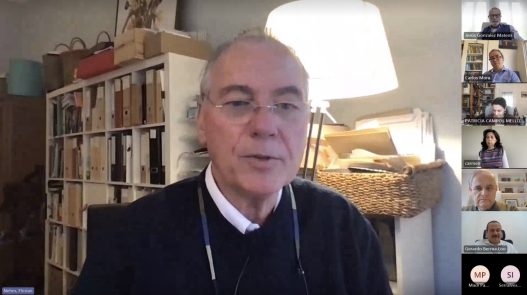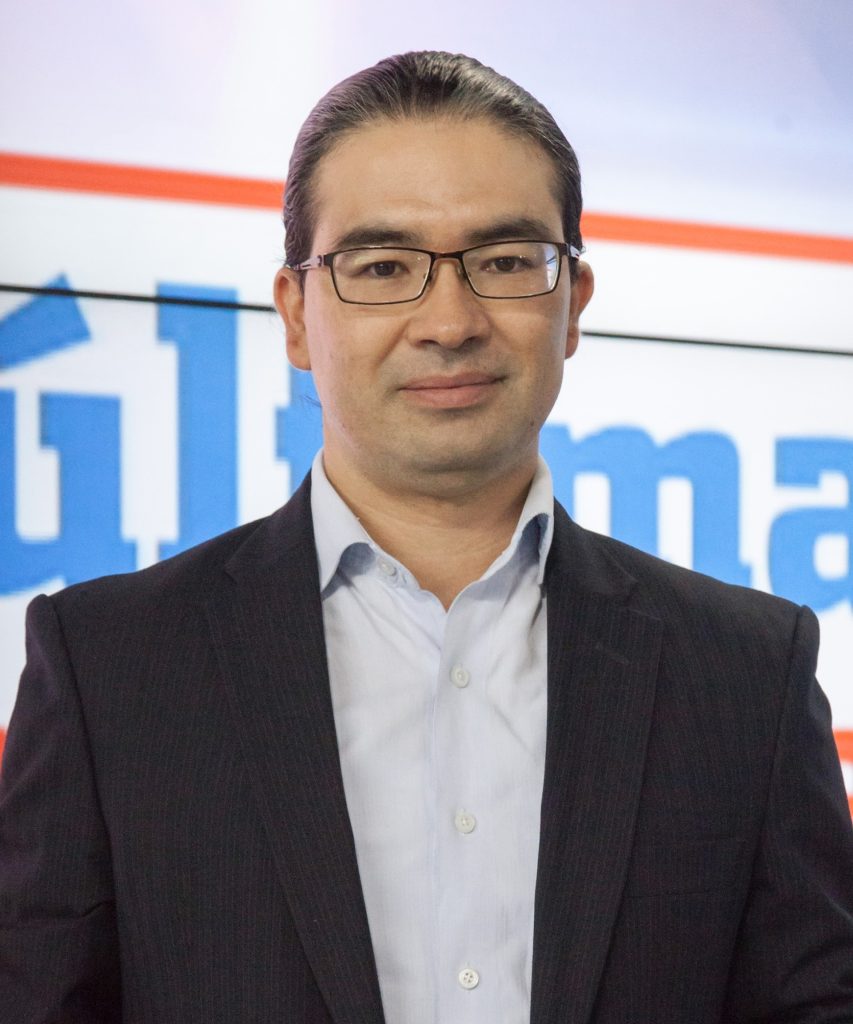
THREE KEYS TO MEDIA SURVIVAL IN THE AGE OF THE NETWORK, GPT CHAT AND AI
Compete with high standards of journalism, negotiate in conjunction with the major technological platforms and national and regional legislations that establish a fair payment of the big Internet for the lucrative use they give to the work of journalists and the media.
Those are three key aspects to give economic viability to the media, which are the ones that pay the salaries to the journalists who create high-value content while the technological platforms are the ones that take the profits from that professional work.
These are the main conclusions of the first webinar organized by EditoRed. The exhibition was led by Florian Nehm, the head of Public Affairs of the German group Axel Springer, promoter of actions aimed at giving economic sustainability to the media.
European and Latin American media editors participated in the virtual meeting, developed on Monday, October 16, 2023.
THE PROBLEM
The large Internet platforms (Google, Meta, X, among others) attract their consumers, to a large extent, with the journalistic information created by the newsrooms. They develop business with that professional work without financially compensating their creators. Thus, the sustainability of the journalistic media has been put at serious risk. Not that of some in particular, but that of all.
That is why, says Nehm, the motto, the objective that various associations of publishers are pursuing is “to achieve economic viability so that a diversity of journalistic offers can be sustained, fundamental for democracy.”
FIRST KEY: PROFESSIONAL AND DIVERSE JOURNALISM REMAINS FUNDAMENTAL
“It would be terrible if few means remained,” says Nehm. That there are “news deserts.” “Competition causes errors to be corrected, the approaches to be completed. Journalists do not like to be left with incomplete or untrue information; they know that no one has the final truth and they are looking for more sources and more news. That is fundamental for democracy.”
The struggle insists, it is to ensure that “our competition can continue to be our competition.”
To favor that dynamic, regulations are needed, Nehm said. Laws are required to stop what can generally be called piracy, which consists of other media or modern computer systems using or copying for their benefit the content created by journalists paid by their publishing houses.
SECOND KEY: TO HAVE MODERN LAWS
“What we want,” Nehm said, “is that an equitable share of the profits that the platforms achieve with our content, produced with our salaries, be granted to us, under legal protection, with modern, stable and effective laws, so that the media are independently sustainable and democracy does not suffer.”
In Latin America there are no experiences of regulations that are responsible for protecting the payment for journalistic content in the era of powerful search engines.
In Europe, Nehm explained, there are experiences, although, in general, they are unfinished tasks.
The European Copyright Directive, for example, fails to establish itself completely. It began in 2010 with legislation in Germany, then followed one in Spain. Afterwards, it was welcomed by the European Commission, but the COVID-19 pandemic delayed its implementation in the Union. Poland has not yet implemented it. “But it’s a weak regulation,” says Nehm.
The Union also issued the Digital Services Law that, among other things, requires social networks to have effective control so that false information is not published.
The example of Australia and Canada
Australia has taken a strong legal initiative since 2020. It is different from the European one, which according to Nehm has a clearer force. And that it has given good results, although not yet the ideals.
This is the Code of Negotiation of News Media and Digital Platforms of Australia that, according to its promoters, has made it easier for Australian media companies to negotiate on more equitable terms with the dominant digital platforms.
According to a report, the Code has made it possible for Google and Facebook to pay more than 200 million Australian dollars annually to large, medium and small news media companies.
Here you can find out what the eight key points of that law are considered. It also summarizes what is established in it. Details about the Law can be found here.
Right now, Nehm said, the technology companies point to their ability to intimidate against a Canadian law, which is struggling to be implemented. This is Law C-18, which obliges platforms such as Google and Facebook to pay the media to include their content in their services. The Law generated strong reactions from both platforms, which threaten not to show the news links to their users in Canada. Here you can see, for example, Google’s reaction.
In the United States there is no favorable outlook for initiatives of this type, because there is a law that prohibits the media from negotiating together because it is considered that there is a danger of monopoly.
A law on AI
Europe is preparing a directive on Artificial Intelligence, but for now it only proposes to regulate the “output”, which is already available to the public, for a kind of risk control.
The European associations of publishers seek to include elements of the “input”, that is, to establish the conditions that must be met by those who use Generative Artificial Intelligence, the transparency requirements that must observe the sector of the digital economy. “But we have not yet achieved it,” acknowledges Nehm, who hopes that elements like these can be included during the temporary presidency of Spain in the European Council.
“The editors have made an effort in the task of devising arguments to include those aspects in the new directive. Regardless of whether or not we manage to get them considered in the final text, the mental and coalition exercise that has been generated in the face of the coming laws will be important,” Nehm explained.
And a new opportunity is not far away. In 2026, by legal mandate, a revision of the Intellectual Property Directive must take place.
A call to Latin America
Neither Europe nor Australia nor Canada can achieve on their own the legal changes that allow the sustainability of the media. “We need to unite and we need the action of Hispanic and Brazilian society,” Nehm said. Together, he said, we form the largest group of countries with a democratic culture that remains in the world, beyond the political ups and downs. “It is the region that contains the values of freedom, which are the basis for the free press and for its economic viability to work.” The Latin American media must “go up their sleeves,” he said, and work hard to achieve better conditions that allow its long-term operation.
THIRD KEY: NEGOTIATE TOGETHER
The technological platforms, says Nehm, have acted to divide publishers, who have not joined forces to improve their negotiating skills.
That is why he proposes that the media strengthen their organizations, associations, federations and that as a group negotiate better conditions with the great technology companies that are enriched by the journalistic work of others.
“The ideal is to achieve the mandatory management company,” says Nehm. That is, joint negotiation is mandatory. That implies something that is still difficult to achieve: that the media give up their freedom to negotiate individually. “That’s still a very slow process,” he accepted.
But he expects media organizations, including those of journalists, to manage with the legislatures and governments of their countries or regions to promote laws that achieve justice in this field.
IS THERE ROOM FOR OPTIMISM?
Nehm told a recent case he knew: entrepreneurs from the energy field of South America went to a small European company that develops Artificial Intelligence. They were looking for an automatic system that reviews what is published in the United States, Europe and Asia about the hydrocarbon market, in the media and in scientific research. And that becomes a report that allows the company to constantly analyze the conditions of that market.
That is, normally, the work done by communication and monitoring offices of the companies, for which they required a large number of people, who delivered weekly reports. This Artificial Intelligence is able to “scan” all that information worldwide and issue reports every 10 minutes.
But for that AI to work, it requires that reliable, verified and proven information first exist, which is what the specialized media produce.
That is where there can be convergences for joint and jointly remunerated work, in recognition of the essential contribution that publishing houses make to the decision-making of corporations of that type.
Nehm, then, emphasized the message that the Axel Springer Group is spreading through its chief executive, Mathias Döpfner: do not fear or reject Artificial Intelligence or automatic content generators (such as Chat GPT). Rather, they must be taken advantage of to take care of repetitive tasks, so that editors and journalists focus on the crucial element of their profession: in-depth research, the search for new topics and approaches, the human side of cold news, something that a robot cannot do.
This text is free to use. If you plan to use it, please cite EditoRed as the source.



